Top 9 website builders that provide email hosting
 By David Nge | Last Updated: October 07, 2025
By David Nge | Last Updated: October 07, 2025
My work is supported by affiliate commissions. Learn More
 By David Nge | Last Updated: October 07, 2025
By David Nge | Last Updated: October 07, 2025
My work is supported by affiliate commissions. Learn More
You need a website, domain, and business email, BUT with so many website builders and email hosting providers available, which one should you choose?
In this article, I'll walk you through:
Let's dive right in.
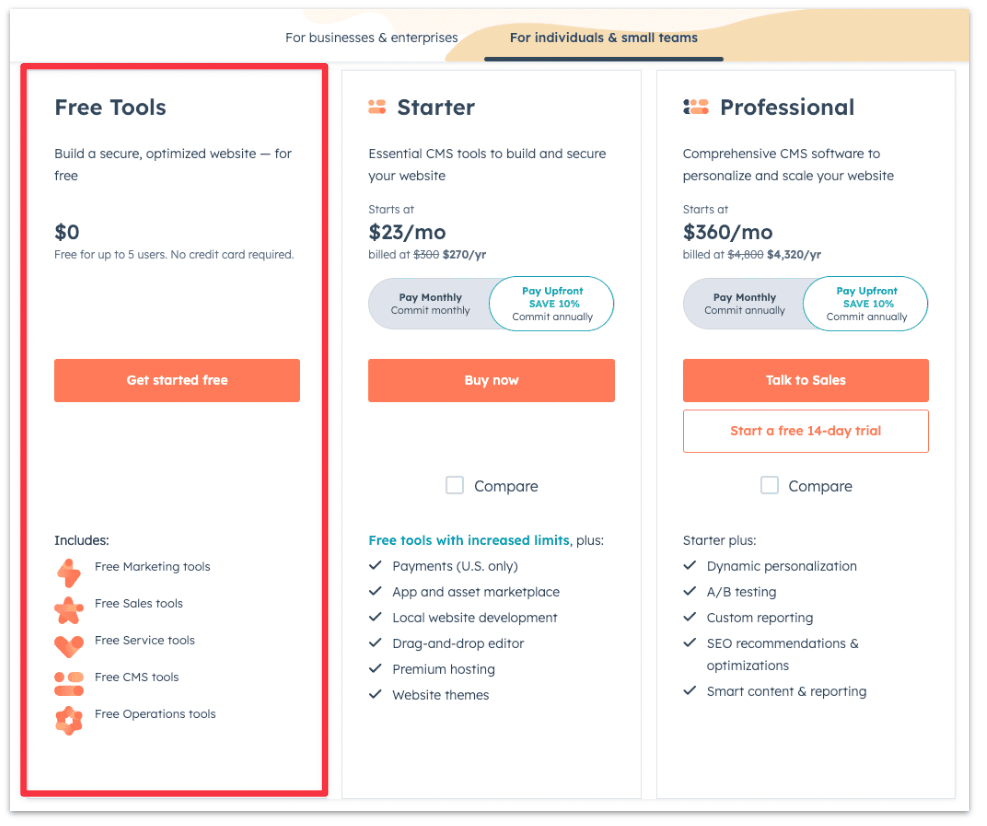
Hubspot started as a Customer Relationship Management (CRM) tool in 2006 but has since grown into an all-purpose marketing software conglomerate today.
Their latest offer, the Free Marketing Hub, offers free CRM tools and provides a free website builder, email marketing, and various other tools tailored for small businesses.
Part of their strategy is a ton of free tools. And that's what Hubspot is doing with their free Marketing Hub.
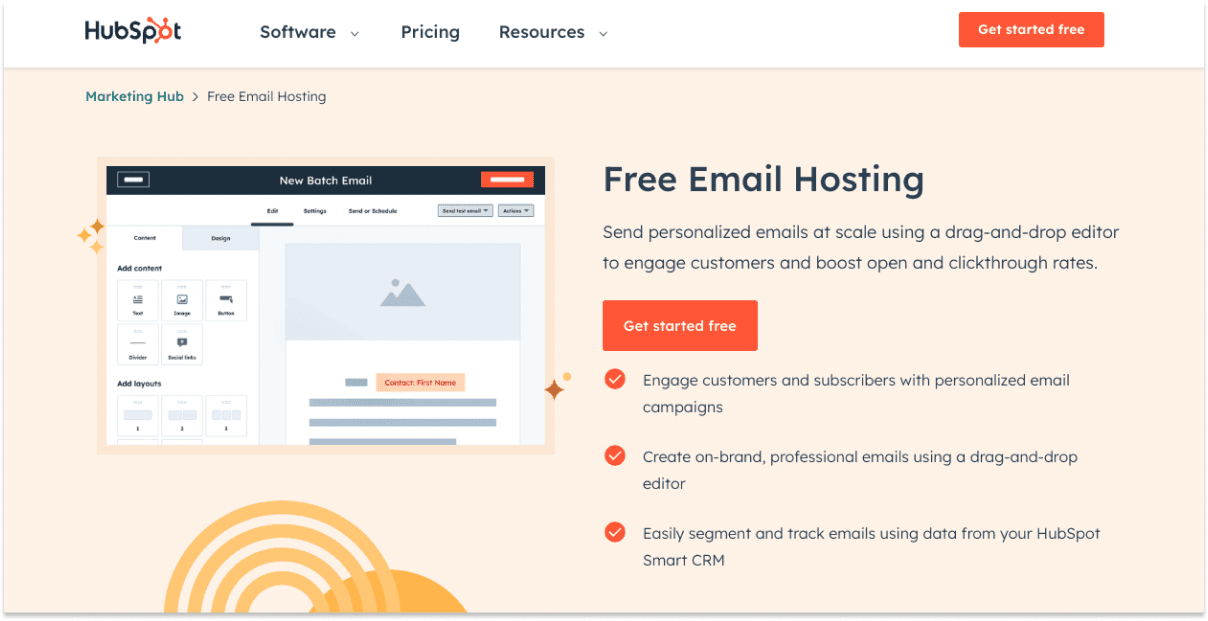
You can build a website, set up a blog, and connect a custom domain, all for free. Plus, you can use the provided free email address from Hubspot to send marketing emails.
But, if you want to send marketing emails from a custom domain you own, like person@companyname.com, you'll need to subscribe to their Starter plan, which costs $18 per month.
Learn more about Hubspot's Free email hosting.
Before you dive in, here are some important considerations to keep in mind, even though Hubspot offers a ton of free features:
If you're a small or medium business owner looking for an affordable website and email hosting, Hubspot is a good place to start.
You can make the most of HubSpot's free website and marketing tools (while they last). Considering all their features, you can go a long way without spending a dime.
Head over to their Free Marketing Hub page and select "Get started free."
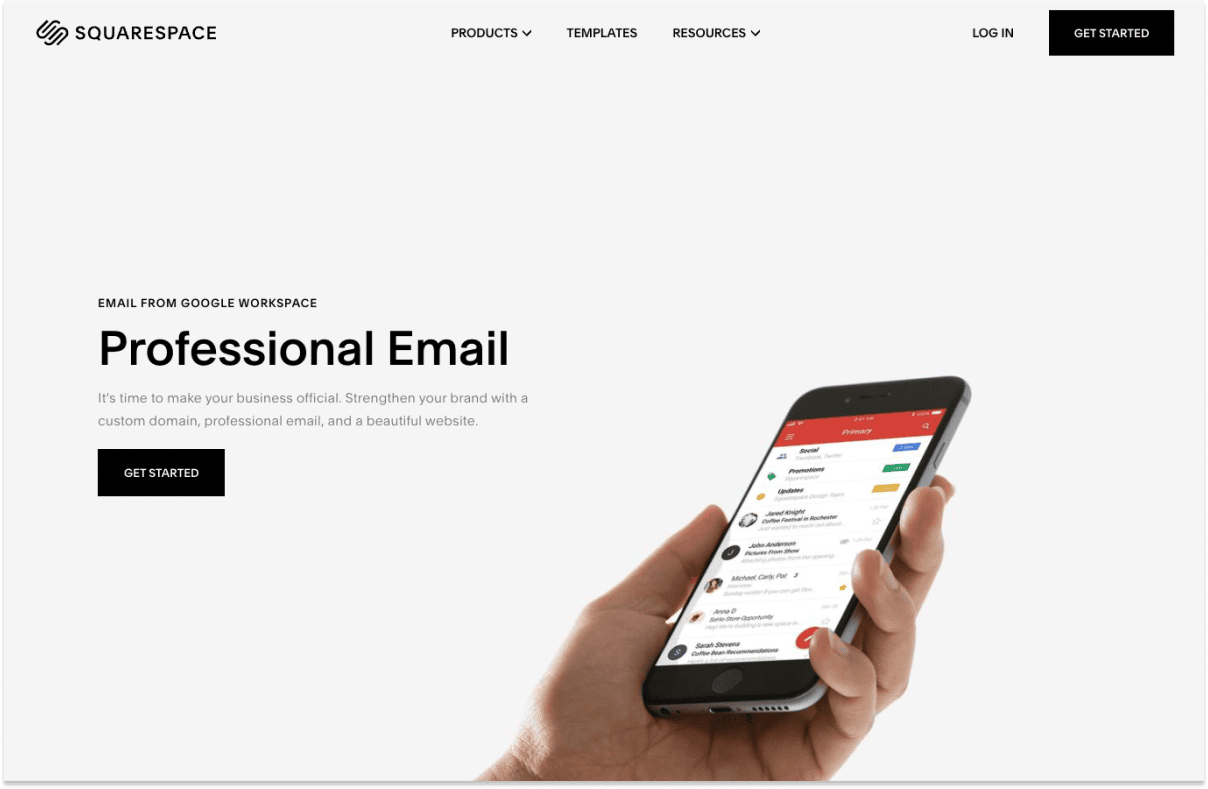
Using Squarespace feels much like using Apple products.
Their website templates are sleek and visually appealing —one of the best in the industry, and the whole website setup process is seamless.
It includes setting up a domain, designing it, managing email campaigns, blogging, and more. Squarespace has done a great job designing the entire user experience of website creation, making it easy for beginners to set up a great-looking site.
Nevertheless, it's worth mentioning that SquareSpace comes with a higher price tag than its competitors, just like Apple. But more on that later.
As for email, Squarespace is a Google Workspace reseller.
When you subscribe to the Squarespace core plan, you'll get a free custom domain, a professional Gmail (i.e Gmail for business), and a Google Workspace account.
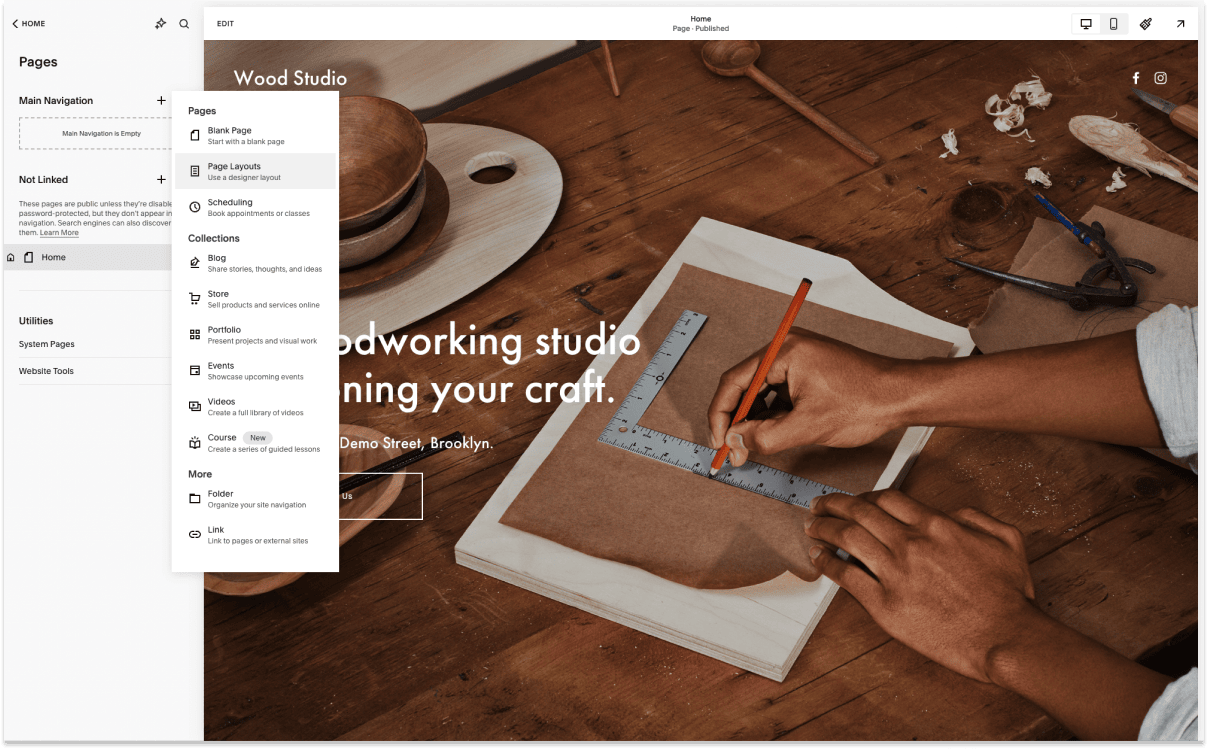
They're free for the first year, and after that, your custom domain and Google Workspace account will automatically renew at the regular annual or monthly rate.
Squarespace doesn't offer a free plan. While you can experiment with designing your site and setting up a blog, you will need to upgrade to a plan if you want to publish your site.
And if you need a custom business email address (that's bundled with the Google Workspace), you'll need to upgrade to the Core plan, which costs $23/month.
Additionally, you'll get the custom domain and Google Workspace for free during the first year. Following this, the domain renewal will cost $20 per year, and the renewal for Google Workspace will be $72 per year.
Learn more about Squarespace Core plan.
No free plan — Squarespace doesn't have a free plan, unlike its competitors such as Wix, WordPress, and Weebly, where you can publish a website live at no cost.
Squarespace is more expensive — Wix, for example, also partners with Google for Google Workspace offers a business plan starting at $17 per month, compared to Squarespace's $23 per month.
Limited extensions/integrations — SquareSpace doesn't have a plugin/widget/app marketplace like Wix and Wordpress. All third-party platforms have to go through Squarespace's official integration channel, i.e. they have to be integrated and approved by the team at Squarespace.
Squarespace is undeniably pricier than some of its competitors. However, Squarespace strikes an excellent balance if you're a beginner who prioritizes great user experience and simply wants an easy way to create an impressive-looking website.
You won't have to wrangle with complex UI editors or manage third-party apps and backups. As Steve Jobs famously said, "it just works".
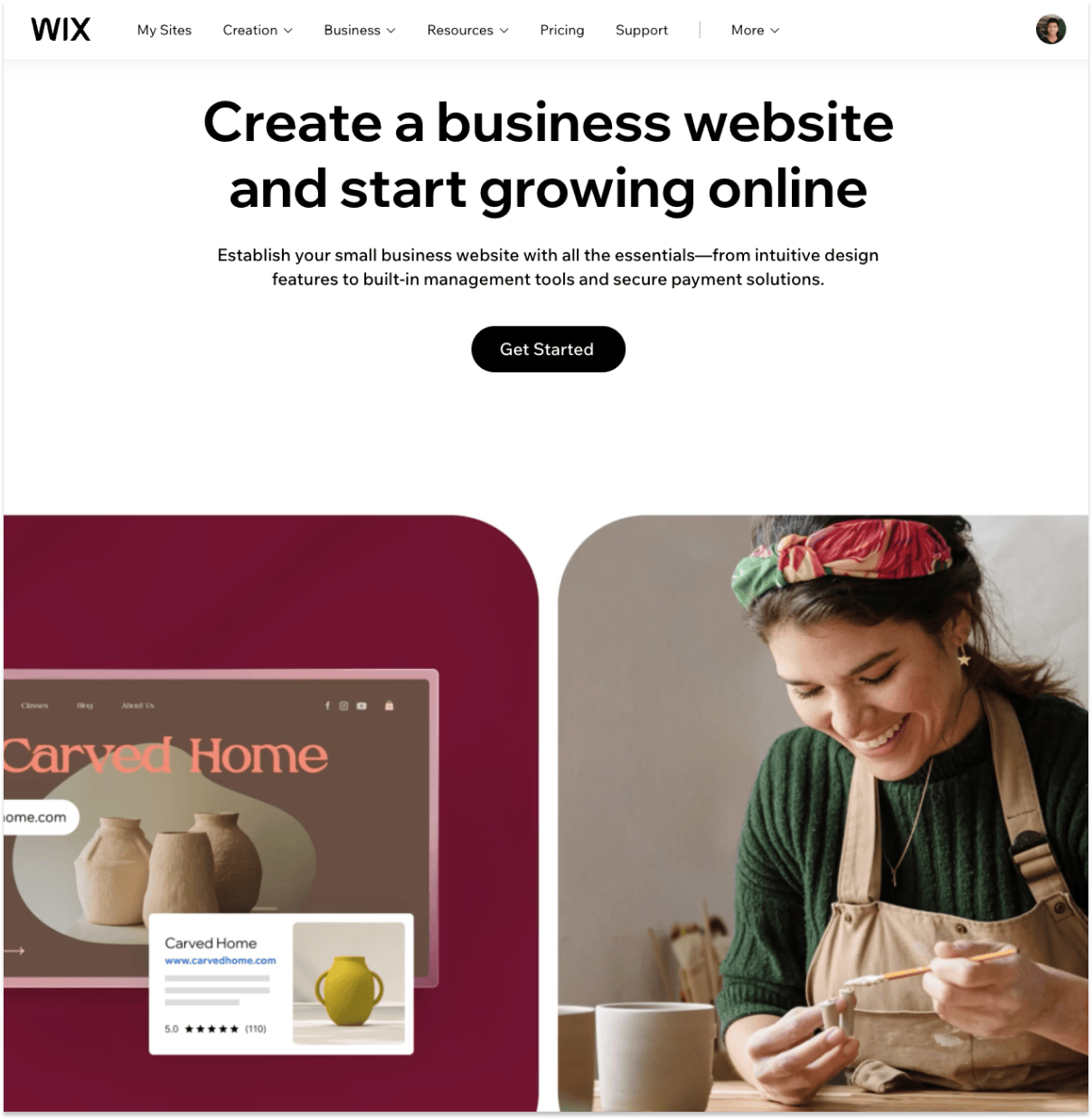
Web designers used to hate Wix for good reasons. Their web editor was slow and lagged all the time; they had a bad reputation for SEO (Reddit posts like this are common), and the whole website creation process was needlessly complex.
But I've given it a good spin over the last few months and was pleasantly surprised by how far they've come along, so much so that I can recommend it to build your own personal site and even for local businesses.
A few major updates that made the difference:
And just like Squarespace, Wix is also a Google Workspace reseller.
You can pick any premium plan on Wix (that allows you to connect your custom domain), and then you can purchase a mailbox, which is essentially a Google Workspace with a custom email address, as a separate add-on.
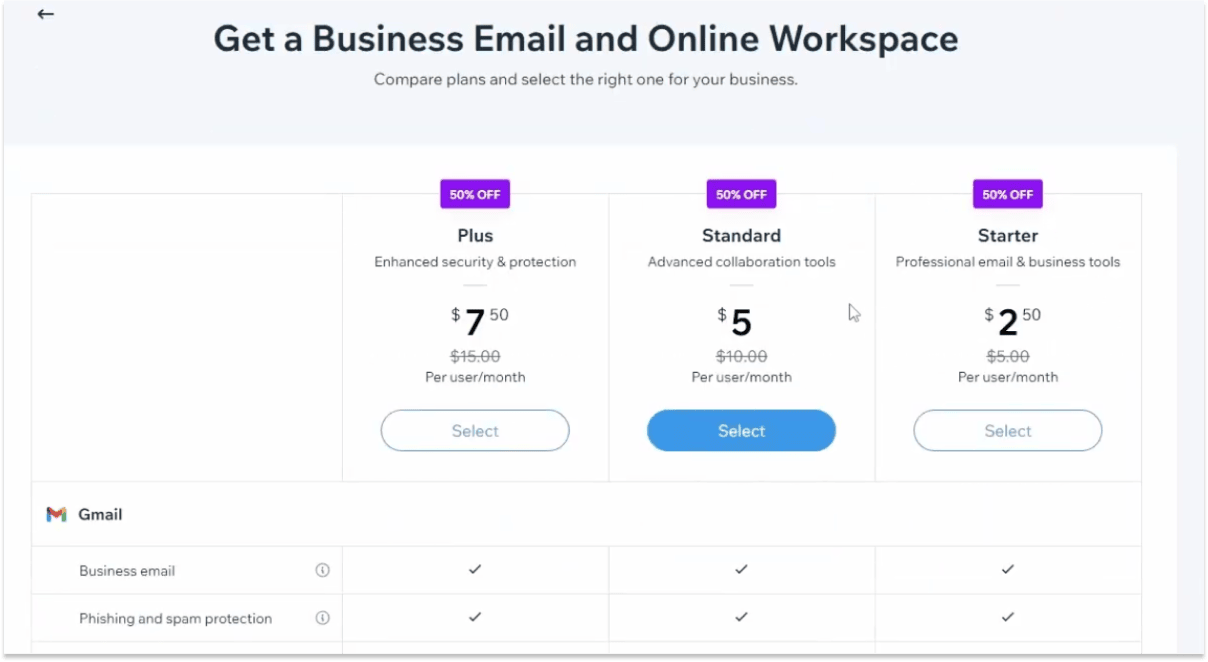
Wix offers a forever-free plan for publishingYou need a website, domain, and email for your business, but there's no shortage of website builders and email hosting companies on a live website, but you won't be able to connect to a custom domain unless you upgrade.
The cheapest Wix premium plan you can purchase is the Basic plan, which costs $4.50/month.
You can purchase the Google Workspace with a custom email address separately for as low as $2.50/month up to $7.50/month, depending on your needs.
Overall, Wix is good for small and medium businesses (SMBs) that don't have a dedicated web support team.
If you need an affordable custom website with email services like inbox and sending email campaigns from a custom business email address, you can get it done with Wix for under $10/month.
Learn more about getting a business email address on Wix.
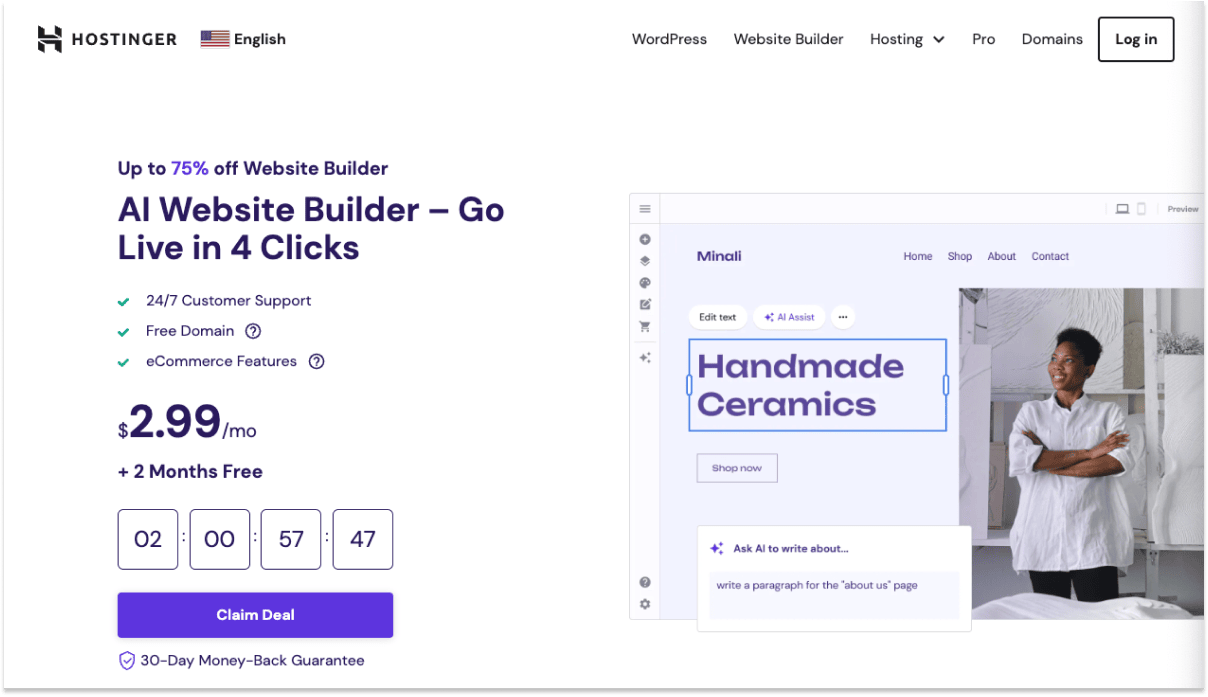
Did you know Hostinger has a side project named Zyro?
Back in 2019, Hostinger introduced Zyro, a simple website builder with AI features, to help users effortlessly establish their online presence with an elegant drag-and-drop website builder
In late 2022, however, they decided to integrate Zyro into Hostinger's main web hosting business.
Hostinger is known for being one of the most cost-effective web hosting solutions in the industry. Now, they can offer even more with their website builder services
Note: You need to sign up for a paid plan to be entitled to these bonuses.
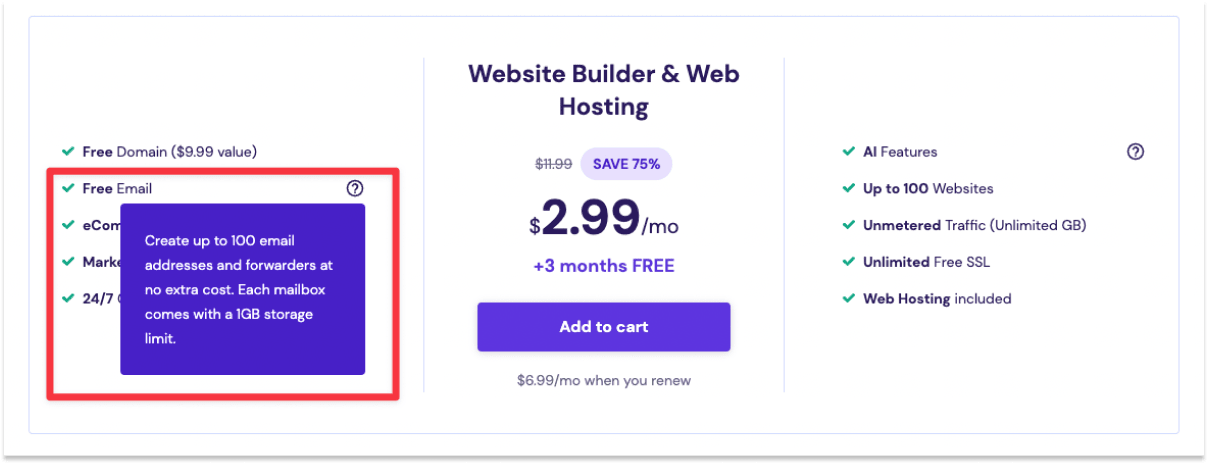
Hostinger's pricing plan differs from other website builders as it requires prepayment for access. You can select a prepayment option for either one month or extend it up to four years:
1 month — $11.99
1 year — $35.88 (which comes up to $2.99/month)
2 years — $71.76 (which comes up to $2.99/month)
4 years — $143.52 (which comes up to $2.99/month)
After the initial plan expires, it will automatically renew at a rate of $6.99 to $11.99, depending on the plan you had previously chosen.
No free plan nor free trial — You need to sign up for a paid plan before you can use Hostinger's website builder. It's a shame, given most website builders let you try out the platform before committing. However, they do have a 30-day money-back guarantee.
Website builder still in its infancy — Hostinger fulfills most basic website needs, but it lacks a robust third-party plugin ecosystem and could benefit from some minor editor improvements. Nonetheless, it's reassuring to know that they have an impressive product roadmap in place for their website builder.
In my experience, Hostinger website builder is mainly used for smaller projects, such as personal websites or marketing sites for small businesses.
You can get by if you want to set up a basic store and sell a few products. Beyond that, I'd recommend a full-featured eCommerce store builder like Shopify, Shift4Shop, and BigCommerce instead.
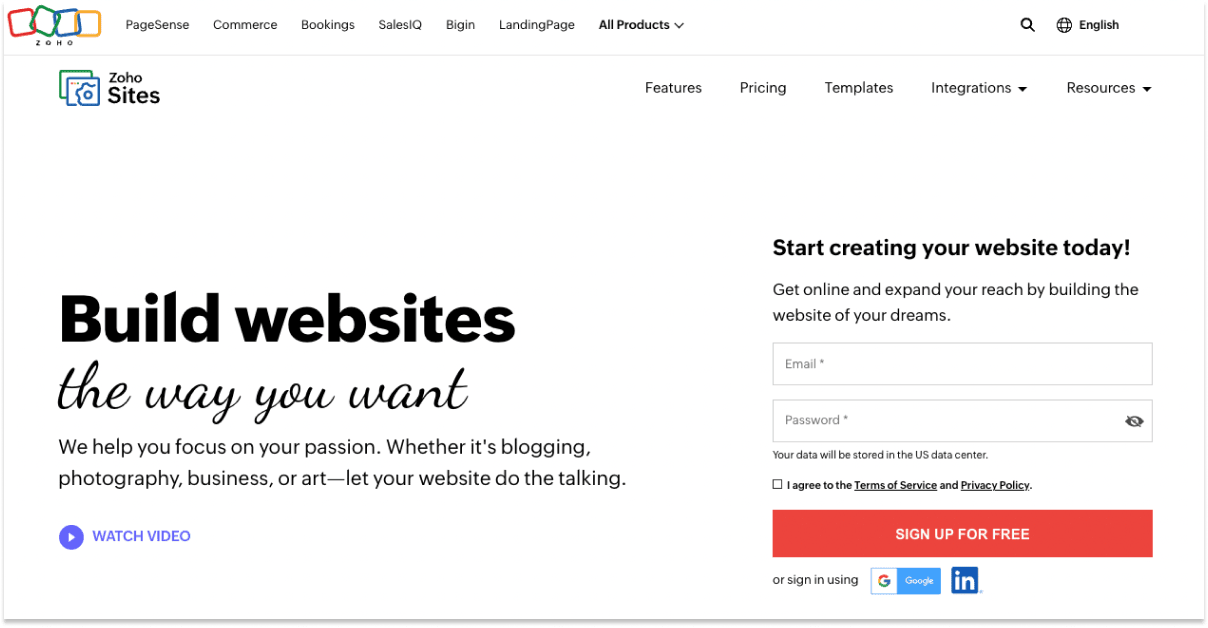
Zoho was a popular CRM tool back in the mid-2000s.
It now offers a range of products that directly compete with tech giants like Microsoft and Google. Their big-hairy-audacious goal is to provide all-in-one web solutions tailored for small businesses, and I think they have a good shot at that.
To date, they've released over 50 products that cater to nearly every online business task:
And a whole host of products not listed here.
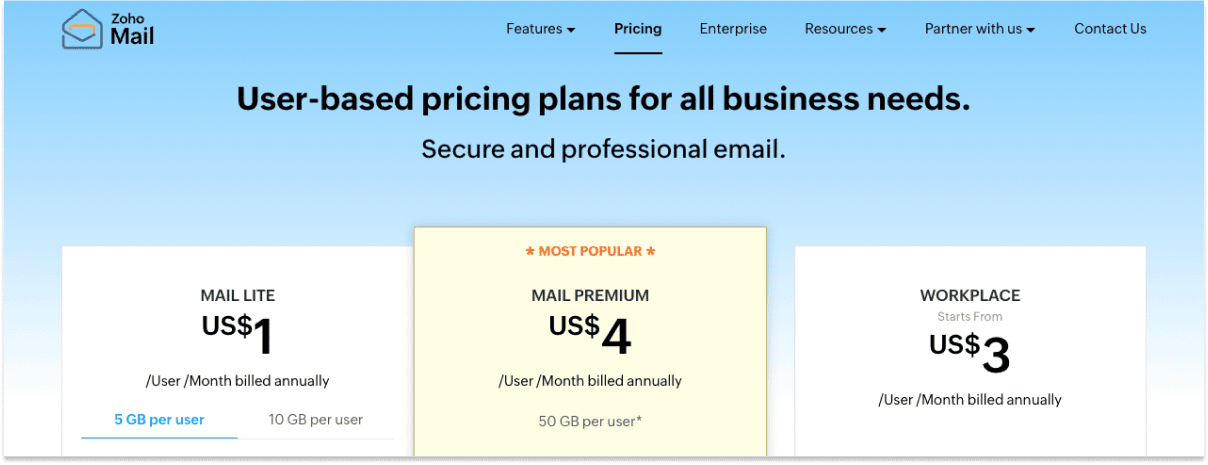
Zoho offers two pricing types, and note that there is NOT a forever-free plan available.
No free plan — But they do offer a 15-day free trial. You won't be able to publish your website online unless you opt for a paid plan.
Customization Constraint — Zoho's website builder primarily uses pre-made sections and templates to kickstart your design. While these layouts are mobile-responsive and adapt to various screens, you might find limited options for creating custom mobile layouts.
Limited documentation and online resources — Be prepared to learn as you go and learn on your own. Unlike more popular platforms like Hubspot, the documentation on how to set up Zoho products seems limited.
For smaller businesses that just need a website with email hosting, there are more affordable options like Hubspot and Wix.
For medium to large businesses with dedicated teams and departments. The Zoho One will save you in the long run. You get bundled access to various tools, including desk support, HR management, and the whole lot, all at a fixed rate.
These website builders and platforms also offer custom email addresses, business mailboxes, and hosting services, but they are either relatively new or deliver subpar performance:
At the moment, these website builders offer email hosting and inbox services:
Almost every website builder lets you use your own domain, but only a few do it without any cost, for example, Hubspot, ConvertKit, and Google Sites,
Here's a comprehensive list of website builders that allow you to add custom domain for free.
You can get a free domain from Freenom, but there is a catch—you can only choose a select domain name.
Here are other ways you can get custom for free.
Hosting is a service that keeps your information online. Web hosting lets you create and store website content, while email hosting stores your email data.
Most web hosting companies allow you to you set up a custom domain and email address on their platform. However, not all website builders come with a website builder.
Some examples of web hosting companies that offer both website builder and email hosting are: